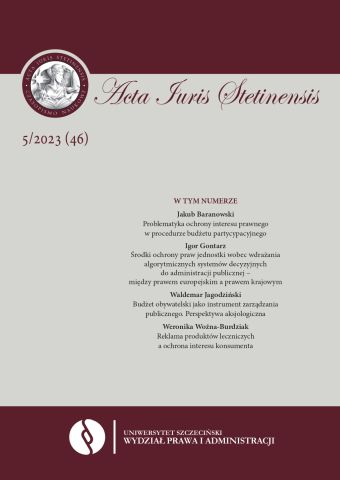Interes prawny jednostki samorządu terytorialnego w perspektywie tzw. rozporządzenia terytorialnego Rady Ministrów
Legal interest of a unit of local government in the perspective of the so-called territorial regulation of the Council of Ministers
Author(s): Joanna BigosSubject(s): Politics / Political Sciences, Politics, Law, Constitution, Jurisprudence, Constitutional Law, Fiscal Politics / Budgeting, Administrative Law
Published by: Wydawnictwo Naukowe Uniwersytetu Szczecińskiego
Keywords: legal interest based on organizational administrative law; unit of local government; “territorial” regulation; asymmetry; protection of legal interest
Summary/Abstract: The article adresses the legal interest of a unit of local government in the perspective of the so-called territorial regulation. The subjective scope of the considerations covers the municipality, poviat and self-governing voivodeship, which obliges to search for the sources of this interest in the organizational administrative law. This involves an examination of organizational norms, taking into account their construction and content specificity. The research assumption adopted leads to the conclusion that if a unit of local government is a structure or institution of organizational administrative law, then, in principle, its legal interest should be qualified in the same way and derive from the same source. The subject of consideration, however, is the special position of a unit of local government exposed to the reduction of the material substrate, and thus passive, in the context of the so-called territorial regulation. This regulation is a special legal act issued by the Council of Ministers, aiming to alter the boundaries of a unit of local government by creating, merging, dividing and abolishing, as well as determining the boundaries of municipalities and poviats, and changing the boundaries of voivodships. It is worth noting that the asymmetry in the position of units of local government, which manifests itself in this process, leads to a certain contradiction. This contradiction does not concern whether the unit of local government, whose material substrate is depleted, has a legal interest, but rather that it may not be entitled to any measures to protect its legal interest. Administrative law research methods have been applied to varying degrees in preparing the text, with the analytical-dogmatic method playing a dominant role. Source materials for writing the article include -legal acts, commentaries and court case law.
Journal: Acta Iuris Stetinensis
- Issue Year: 2023
- Issue No: 46 (5)
- Page Range: 21-36
- Page Count: 16
- Language: Polish

